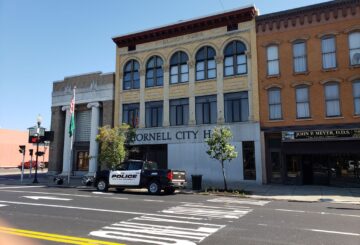Early voting begins October 28, Election day is November 7
By Bob Confer
To many, this November’s ballots lack the interest and political drama of next year’s, when voters will choose the President of the United States and contentious down-ballot races will loom large across the country.
But, that doesn’t mean this year’s elections are meaningless. Every election matters, especially when it comes to local offices…and bonus items. This November, New Yorkers have the chance to decide on two amendments to the state Constitution.
As I do in this column whenever proposals come to the fore, I offer a quick review of each.
Proposal one asks the following: The proposed amendment to Article 8, section 4 of the Constitution removes the special constitutional debt limitation now placed on small city school districts, so they will be treated the same as all other school districts. Shall the proposed amendment be approved?
For purposes of this constitutional amendment, a small city school district is one that includes at least part of a city that has a population of fewer than 125,000 people. To put that into perspective, among those within the readership of this column, small cities are Batavia, Lockport, Niagara Falls, and North Tonawanda. There are 57 such districts across the state.
In its current form, the state Constitution limits how much debt a small city school district can have. It can’t be more than 5% of the value of taxable real estate in the district (although there are exceptions for certain expenses).
Other school districts, such as rural ones most common to this readership, are not subject to a constitutional debt restriction. Instead, theirs is provided by state law. Currently, it can’t be greater than 10% of the value of taxable real property within the confines of the district. If this amendment passes, small city school districts would be eligible to have the same debt limit as those other districts, whether it’s that 10% or the next value enacted by legislative action.
Proponents of the “yes” vote, such as various school officials and New York State United Teachers, cite greater flexibility when it comes to investing in infrastructure and facilities. Most school campuses are aged, going back to the school construction boom of the 1950s and 1960s, and some are even older than that. To update such facilities – especially when it comes to HVAC, modernization, connectedness, and electrification – takes a considerable amount of money that can exceed the current debt limit.
Those who suggest voting “no”, which seems to be only individuals and no distinct organizations, indicate that New York’s spending per pupil is already the highest in the nation and small city school districts already have the ability to exceed the constitutional debt limit if they rely on the consent of the governed – every debt-incurring investment they propose can happen if 60% of voters approve it.
The second proposal on the ballot asks: The proposed amendment to Article 8, section 5 of the Constitution extends for ten years the authority of counties, cities, towns, and villages to remove from their constitutional debt limits debt for the construction of sewage facilities. Shall the proposed amendment be approved?
The state Constitution limits the debt counties, cities, towns and villages can incur, capping it at 7% to 10% of the value of real property within their jurisdiction. That limit, under the existing exemption, does not include debt for sewage treatment and disposal construction projects. Every 10 years since 1963, voters have been asked to extend that exemption. The active exemption is set to expire on January 1st.
Those who would like to see this amendment passed – of which there are many from municipal leaders to the organizations they belong to – note that the costs of upgrading or replacing sewage treatment plants and systems are incredibly high. Were those investments put into the standard debt basket some municipalities would choose to push out those expenditures to a later date, or spend less on them, which can put public and environmental health at risk in the event of a sewer failure.
A deep search of the internet and social media finds nary a voice opposed to this 10-year extension, likely because it has been the way of doing things for the past 60 years. Once something becomes tradition and has been passed a half-dozen times already, by a wide margin, it would be hard to fight or find fault in it. It works.
Make your voice heard about these ballot items – and your local offices — this November (or October, if you choose early voting). Just be sure to turn the ballot over to find the constitutional amendments!






